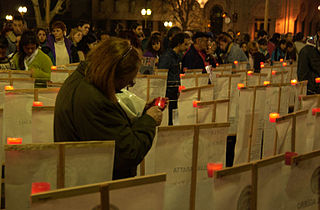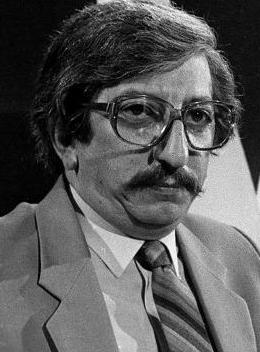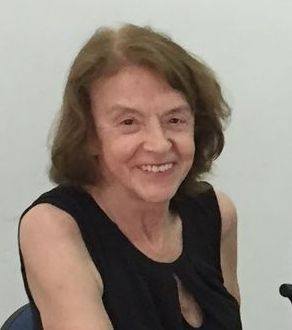
Bernardo Alberto Houssay was an Argentine physiologist. Houssay was a co-recipient of the 1947 Nobel Prize for Physiology or Medicine for discovering the role played by pituitary hormones in regulating the amount of glucose in animals, sharing the prize with Carl Ferdinand Cori and Gerty Cori. He is the first Latin American Nobel laureate in the sciences.

Buenos Aires, officially the Autonomous City of Buenos Aires, is the capital and primate city of Argentina. The city is located on the western shore of the Río de la Plata, on South America's southeastern coast. "Buenos Aires" is Spanish for "fair winds" or "good airs". Buenos Aires is classified as an Alpha global city, according to the Globalization and World Cities Research Network (GaWC) 2020 ranking.

Bernardino de la Trinidad González Rivadavia was the first President of Argentina, then called the United Provinces of the Río de la Plata, from February 8, 1826 to June 27, 1827.

A fire broke out in the crowded República Cromañón nightclub in Buenos Aires, Argentina on 30 December 2004, killing 194 people and leaving at least 1,492 injured. The direct cause was the indoor pyrotechnics igniting the ceiling. It was a fireworks-related fire and a nightclub fire.

Florentino Ameghino was an Argentine naturalist, paleontologist, anthropologist and zoologist, whose fossil discoveries on the Argentine Pampas, especially on Patagonia, rank with those made in the western United States during the late 19th century. Along with his two brothers – Carlos and Juan – Florentino Ameghino was one of the most important founding figures in South American paleontology.

Delia Delfina Degliuomini de Parodi was an Argentine politician and the first Argentine woman to hold a prominent elected post.

Diana Beatriz Conti was an Argentine lawyer and politician. She was a member of the Argentine National Congress both as a National Deputy and as a Senator (2002–2005); she also served as Undersecretary of Human Rights in the administration of Fernando de la Rúa from 1999 to 2001 and as a member of the Council of Magistracy from 2006 to 2010, where she rose to prominence as a staunch supporter of President Cristina Fernández de Kirchner's judicial reform proposals.

Dante Caputo was an Argentine academic, diplomat and politician, who served as the nation's foreign minister under President Raúl Alfonsín.

Victoria Analía Donda Pérez is an Argentine human rights activist and legislator. She is the first daughter of a "disappeared" person, born in captivity, to become a member of the Argentine National Congress. She was the youngest woman to hold that office.

Foreign relations between Argentina and France, have existed nearly a century. Both states are members of the G-20.

María Eugenia Estenssoro is a Bolivian Argentine politician, journalist and activist for women's rights. She represented the city of Buenos Aires in the Argentine Senate from 2007 to 2013.

Marta Minujín is an Argentine conceptual and performance artist.
Daniela Castelo was an Argentine journalist, eldest daughter of Adolfo Castelo (1940–2004). She attended secondary school in the Liceo Nacional 9 in Buenos Aires. She graduated in psychology at the University of Buenos Aires Faculty of Psychology.

Enrique Pichon-Rivière was a Swiss psychiatrist naturalized Argentine, considered one of the introducers of group psychoanalysis in Argentina and generator of the group theory known as Grupo operativo.

María Ruanova was an Argentine dancer, choreographer, teacher and ballet master, known for her performances at the Teatro Colón and internationally. She is considered the first Argentina-grown ballet dancer to gain international fame.

María Teresa Ferrari was an Argentine educator, physician, and women's rights activist. She was the first female university professor in Latin America and one of the first women allowed to teach medicine. She was a pioneering researcher in women's health, studying the use of radiation therapy rather than surgery for uterine tumors and developing a vaginoscope that revolutionized women's health care in Brazil. She established the first maternity ward and gynecological services at the Hospital Militar Central of Buenos Aires in 1925, which provided the first incubation services in the country.

Romina Del Plá is an activist in the Workers' Party (Argentina).

Lily Sosa de Newton was an Argentine historian, biographer and essayist. She was a pioneer in historical research on Argentine women in different fields. She also wrote numerous biographies of historical figures.

Alicia Beatriz Casullo was an Argentine psychoanalyst. She served as president of International Psychoanalytical Studies Organization (IPSO), and was a founding member and head of the Sociedad Argentina de Psicoanálisis (SAP). She was also a member of the Federación Psicoanalítica de América Latina, and the International Psychoanalytical Association (IPA).

Mónica Fernanda Macha is an Argentine politician, currently serving as National Deputy representing Buenos Aires Province. A member of New Encounter, Macha was elected in 2017 for the Unidad Ciudadana coalition, and currently sits in the Frente de Todos bloc. She previously served as a member of the Provincial Senate of Buenos Aires Province.

















